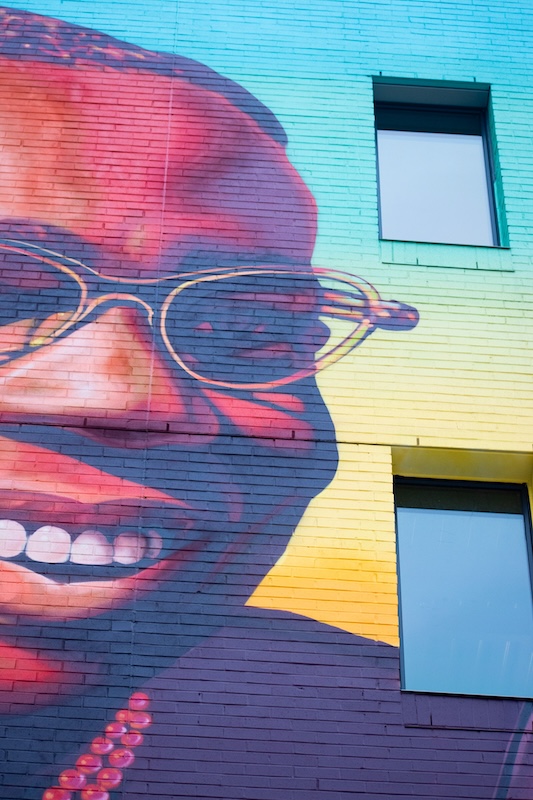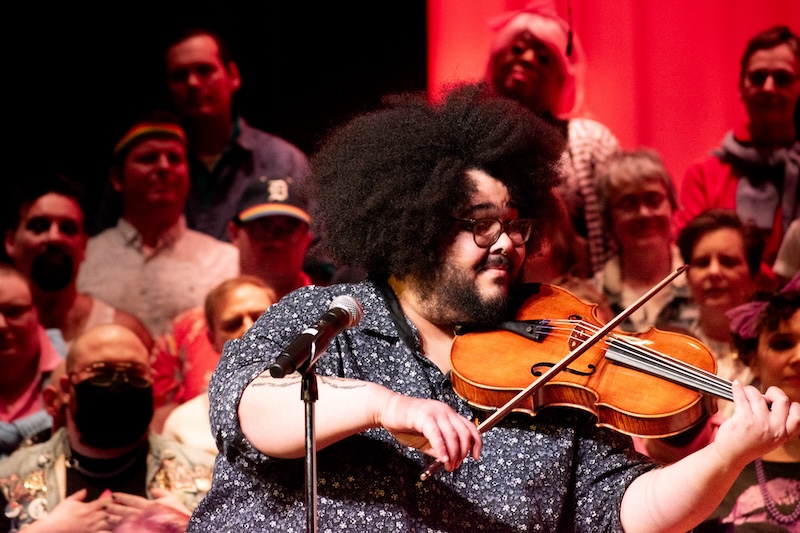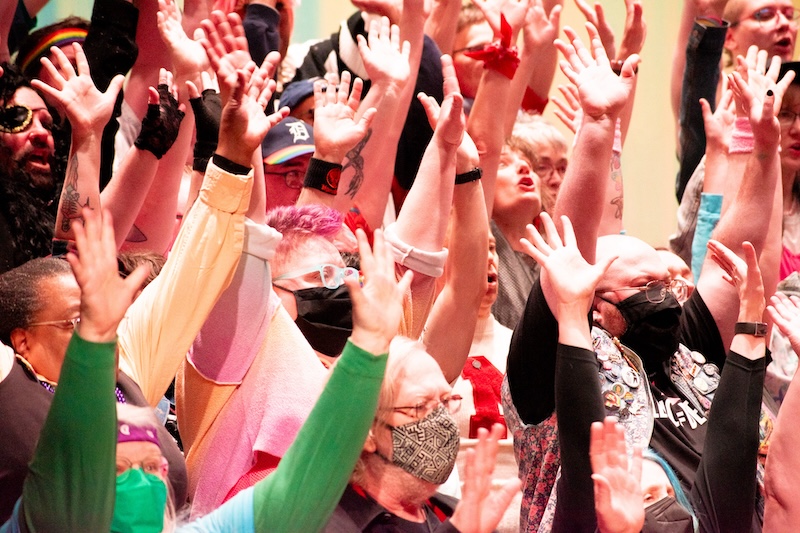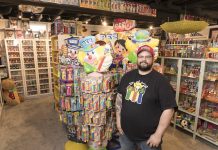Their spaces are places for learning, growth, and connection; they are homes and refuges. And the spaces provide resources to community members, from education to advocacy work to medicine and counseling.
Every few months, Tory Sparks drives several hours to host LGBTQ+ trivia at in Ann Arbor. For two weeks leading up to their concerts, Tim Hamann works upwards of 30 hours to put on performances with , also in Ann Arbor. And Nazarina Mwakasege pours hope, fear, and fierce love every week into supporting the young people of the Ruth Ellis Center in Detroit and Highland Park.
These organizers are in the midst of a shared struggle to maintain LGBTQ+ spaces in southeast Michigan. LGBTQ+ spaces are , and Michigan is no exception as economic downturns strain operations and even push some long-standing spaces to close.
The remaining spaces cling to single weekdays, special events, and scarce resources to maintain a foothold in their communities. Amid these challenges, organizers sacrifice countless hours of work, energy, and emotional labor to preserve community spaces.
“Every day is a labor of love,” says Mwakasege, director of development and advancement at the . “Because there is just never enough. There are never enough resources, and there is never enough acknowledgment of the real work that it takes.”

Though Michigan is rarely recognized as a hub for the LGBTQ+ community, the state has a rich history of queer spaces spanning back more than a century, says , assistant professor, fixed term, of history and LGBTQ+ studies at Michigan State University. Throughout the 20th century, the proliferation of LGBTQ+ spaces and neighborhoods in southeast Michigan followed the spread of highways connecting Detroit to surrounding cities, he says.
Michigan’s LGBTQ+ spaces faced the heavy threat of criminalization, surveillance, and general stigma throughout their existence, Retzloff says. Nonwhite LGBTQ+ communities in and around Detroit felt the pressures most sharply. In fact, the only two gay bars in Detroit that police ever brought up on official charges of violating the Michigan Liquor Control regulation for serving homosexual clientele, were bars that served primarily Black customers, he says.
The COVID-19 pandemic and the expansion of online spaces introduced new financial and logistical challenges to queer spaces, says , a professor of women’s and gender studies at Eastern Michigan University. And to their volunteers, who have the heavy burden of keeping the spaces afloat, she says.
Volunteers like Sparks, Hamann, and Mwakasege strive to create spaces that offer more than just the typical male-dominated gay club scene. Their spaces are places for learning, growth, and connection; they are homes and refuges. And the spaces provide resources to community members, from education to advocacy work to medicine and counseling.
“A lot of this community work tends to rest on just a few people’s shoulders,” Currans says. “And while those people often enjoy their work up until a certain point, when they get exhausted, who steps in?”
To Find Each Other and Learn Together

Every Thursday evening, the noise from a small, split-level bar in Ann Arbor’s Kerrytown District spills out onto the streets: echoes of laughter, chatter, and triumphant cheers. LGBTQ+ nights at North Star Lounge feature a rotation of events from drag shows to trivia — and for Sparks, the latter has become more than a game night.
Being surrounded by community “is one of the best feelings in the world,” says Sparks. “We are connecting, we are building something, we are learning about our community.”
Sparks painstakingly designs new questions for each game they host, a process that can take up to eight hours. Each question is an opportunity to teach participants about their community, history, and culture. The more diverse a team is — be that in age, race, gender identity, or more — the more likely the team is to win, Sparks says.
Participants can “learn about LGBT things that are hidden from history and learn about LGBT things that are happening now,” Sparks says.
Sparks began hosting trivia in late 2022 when they lived in Ann Arbor. Last year they moved toĚýInterlochen, south of Traverse City, and they now drive downstate to host; they get paid, but often only enough to cover the cost of travel and expenses. Sparks also balances trivia work with personal and professional obligations that can make hosting LGBTQ+ trivia a “logistical nightmare.”
In some ways, “it doesn’t make sense for me to keep doing this,” Sparks says. But “I fear that if I pass it along, and it changes, that this thing that is so vibrant and beautiful might die.”
Sparks no longer hosts the event monthly, but they hope trivia night continues to foster community, pride, and learning for local LGBTQ+ people.
When people whose identities are stigmatized “come together and celebrate ourselves — and we affirm that identity and we feel in community — that is worth protecting at all costs,” Sparks says.
To Love Each Other and Express Pride

Out Loud Chorus transformed Washtenaw Community College on Huron River Drive into a spectacle of neon and nostalgia for its Like, Totally ’80s! concert for one weekend only in January. Lit by a rainbow of lights, choir members of all ages packed onto the stage for two shows to pay tribute to LGBTQ+ lives and love of the past.
Out Loud Chorus is an LGBTQ+ choir that was founded in 1995. It is open to anyone over 16, does not require an audition to join, and now has over 130 singing and nonsinging members. They rehearse every Monday for two big concerts a year, as well as a few smaller performances.
“We give people that opportunity to feel a connection and develop a sense of who they are,” says Hamann, a board member. “And hopefully then go out into the world at large and feel safer and feel more self-assured and express themselves exactly as they are.”
Hamann joined the choir in 2009 looking for a social outlet, and he later became a member of the board. Out Loud Chorus relies on fundraising and volunteers. As a board member, Hamann typically volunteers two to 10 hours a week. But leading up to a concert, he might work as many as 30 hours.
“I take days off from work at concert time because I just can’t work a day job and do this,” Hamann says.
The choir has grown and evolved over the years, introducing the financial hurdle of finding space for a larger group of people to rehearse and perform. The work is necessary to maintain a social space for LGBTQ+ people that does not revolve around alcohol or dating, despite the challenges, Hamann says.
“It is worth it for the new people who come through the door at the beginning of every semester,” Hamann says. “I get to see someone onstage performing a solo when two years ago, I saw them hiding in the back and afraid to sing. It is a very uplifting group.”
To Live Safely and BelongĚý

Rainbow-hued murals of historical figures and current residents, all people of color, cast the Ruth Ellis Clairmount Center for homeless LGBTQ+ people in a veritable kaleidoscope. The colors decorate the wellness clinic, the residence halls, and even the staff offices, marking the space as one for LGBTQ+ joy and safety.
Being in the center feels like “a celebration and a challenge,” Mwakasege says. “We exist to celebrate the resilience of this incredibly vulnerable population, while at the same time acknowledging some of the horrendous things that a lot of young people had to endure just to get to us.”
The Ruth Ellis Center was originally a drop-in center for LGBTQ+ young people founded in 1999, named after a community elder known for opening up her house to queer people in need. The organization now operates four sites primarily for LGBTQ+ people of color who are experiencing homelessness, involved in the child welfare system, or facing obstacles to health and well-being. And the services offered — from clothing to internet access and events — are vast.
Maintaining the Ruth Ellis Center takes enormous physical, mental, and emotional labor, Mwakasege says. Many of the staff members are also LGBTQ+, and it takes a toll on them to see the trauma that their community members have faced, she says.
“The work that needs to be done to activate some of the resilience necessary to be who you are when you are part of a marginalized community is a lot,” Mwakasege says.
The center’s myriad services are made possible through a network of donors, corporate partners, and volunteers. They leverage the support of the larger community to collect and redistribute resources.
But the organization still has limited assets. The staff constantly strategizes to make do with what they have and to meet “some incredibly critical needs,” Mwakasege says. At the end of the day, they do the work because they are a part of the community and there are not many other people who will do it.
“The young people in this community are a testament to survival, and it’s our greatest honor to be able to do this work with them,” Mwakasege says. “They are so incredible and so talented in spite of so many barriers placed in front of them and the barriers that are placed in front of us to try and do this work and uplift them.”
|
| Ěý |
|








